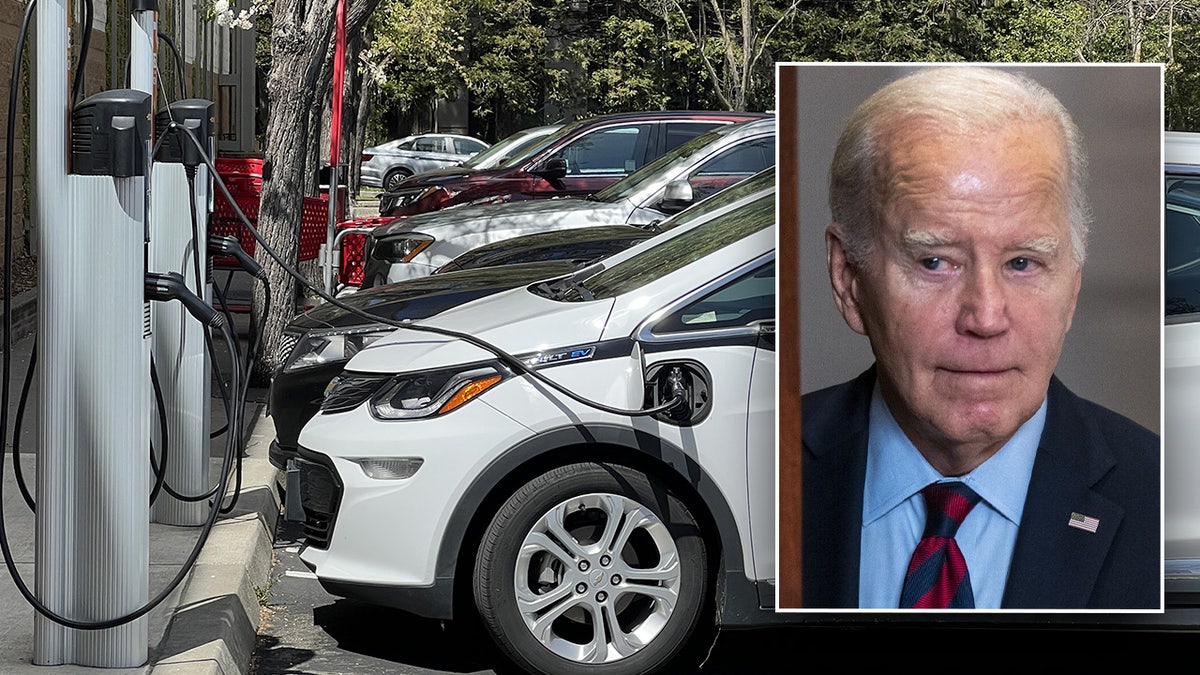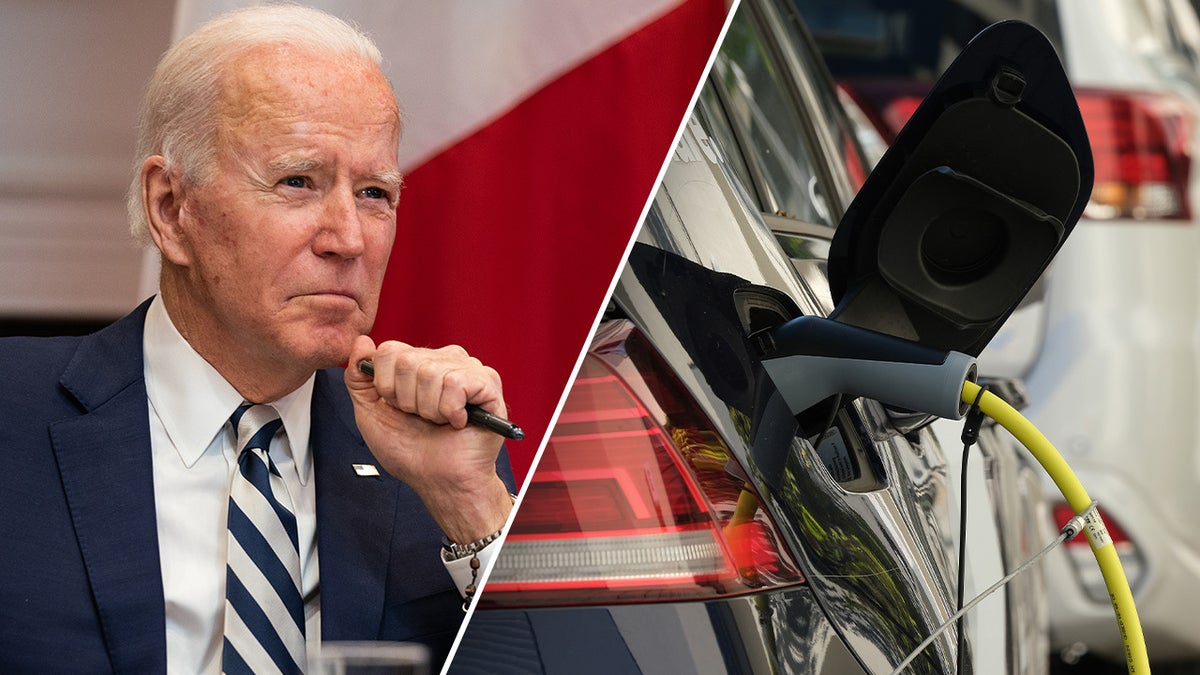FIRST ON FOX: A coalition of 25 Senate Republicans joined by Sen. Joe Manchin, D-W.Va., are introducing legislation to block the Biden administration from moving forward with regulations targeting gas-powered car tailpipe emissions.
The lawmakers, led by Senate Finance Committee Ranking Member Mike Crapo, R-Idaho, and Sen. Pete Ricketts, R-Neb., are expected to introduce the Choice in Automobile Retail Sales (CARS) Act later Thursday. The legislation, if passed, would strike down the Environmental Protection Agency’s (EPA) proposal unveiled earlier this year that would significantly tighten vehicle tailpipe emissions restrictions.
“Once again, the Biden administration’s rule-making process is being used to push a radical green agenda and pick winners and losers,” Crapo said in a statement to Fox News Digital. “Americans deserve to have access to affordable, reliable vehicles fueled by American-made energy products.
“However, the Biden EPA’s rule change would hurt everyday Americans while simultaneously helping China. Consequences of rules and regulations such as these restrict consumer choice and raise costs for the average American family.”
BIDEN ADMIN FACES PRESSURE TO DROP ELECTRIC VEHICLE MANDATE REGULATIONS: ‘THIS IS ALARMING’
Senate Finance Committee Ranking Member Mike Crapo, R-Idaho, (left) and Sen. Pete Ricketts, R-Neb., (right) will introduce the Choice in Automobile Retail Sales Act Thursday. (Getty Images)
In April, the EPA proposed regulations that were the most aggressive for federal tailpipe emissions ever crafted. If finalized and implemented, a staggering 67% of new sedan, crossover, SUV and light truck; up to 50% of bus and garbage truck; 35% of short-haul freight tractor; and 25% of long-haul freight tractor purchases could be electric by 2032, the White House projected.
Critics of the rules accused the EPA of attempting to use the proposal as a backdoor electric vehicle (EV) mandate, essentially forcing future purchases of zero-carbon vehicles.
STUDY CASTS DOUBT ON ELECTRIC VEHICLES’ CLIMATE, COST BENEFITS: ‘WON’T ACHIEVE THE GOALS INTENDED’
In addition to blocking the proposed tailpipe emissions regulations, the CARS Act would prohibit regulations mandating the use of any specific technology or regulations that limit the availability of new vehicles based on engine type. The legislation would additionally require the EPA to update any regulations that limit new vehicles based on engine type within two years.
“We cannot allow the EPA to continue to impose oppressive and careless regulations that increase our dependence on foreign adversaries like China and make everyday necessities more expensive for Americans and their families,” added Manchin, who chairs the Energy and Natural Resources Committee. “I waited in line for gas in the ’70s because America was too reliant on foreign oil, and I refuse to risk one day waiting in line for a Chinese battery.

President Biden talks to EPA Administrator Michael Regan during a White House event on environmental justice earlier this year. (Drew Angerer/Getty Images)
“This bipartisan legislation would rescind this federal overreach and protect access to traditional, affordable vehicles,” the West Virginia Democrat added. “As chairman of the Senate Energy and Natural Resources Committee, I will continue to lead the fight against EPA’s radical climate agenda to protect our energy, national and economic security.”
In addition to Crapo, Ricketts and Manchin, 23 Senate Republicans joined the effort Thursday as co-sponsors. Energy and Natural Resources Committee Ranking Member John Barrasso, R-Wyo.; Environment and Public Works Committee Ranking Member Shelley Moore Capito, R-W.Va.; Banking Committee Ranking Member Tim Scott, R-S.C.; and Foreign Relations Committee Ranking Member Jim Risch, R-Idaho, were among those co-sponsors.
The CARS Act has also received widespread endorsements from industry groups like the American Petroleum Institute and American Fuel & Petrochemical Manufacturers and conservative groups like Heritage Action and the National Taxpayers Union.

President Biden previously set a goal of ensuring 50% of car purchases are electric by 2030. (Getty Images)
“We welcome Sen. Crapo’s and Sen. Ricketts’ efforts to safeguard Americans’ freedoms and prevent the EPA from imposing a de facto ban on the sale of new vehicles that use gasoline and other liquid fuels,” said Amanda Eversole, the American Petroleum Institute’s executive vice president and chief advocacy officer.
“The Senate should work expeditiously to pass The Choice in Automobile Retail Sales Act to ensure the EPA’s intrusive government policy doesn’t limit American families’ access to affordable and reliable vehicle options.”
Chet Thompson, the president and CEO of the American Fuel & Petrochemical Manufacturer, added the CARS Act will “preserve consumer choice and allow individuals and families to continue selecting the cars and trucks that work best for them.”
Since the Biden administration proposed the tailpipe emissions rules in April, which would impact car model years 2027 through 2032, lawmakers, including those who introduced the CARS Act, and energy experts have blasted the proposal. They argued EVs are costly, less efficient and more dependent on Chinese supply chains than traditional gas-powered cars.

President Biden previously set a goal of ensuring 50% of car purchases are electric by 2030. The White House said in April the EPA’s proposed tailpipe rules would provide a “clear pathway for a continued rise in EV sales.” (Anna Moneymaker/Pool/Getty Images | Sean Gallup/Getty Images)
CLICK HERE TO GET THE FOX NEWS APP
The average cost of an EV was $65,291, and the average cost of a car with an internal combustion engine was $48,094 last year, according to Kelley Blue Book. And the Department of Energy reported that the average range of model year 2021 gasoline vehicles was 403 miles compared to the median 234-mile range of model year 2021 EVs.
The EPA’s tailpipe regulations are coupled with a series of other actions pursued by the Biden administration targeting gas-powered cars. The Department of Transportation’s National Highway Traffic Safety Administration proposed aggressive fuel economy regulations earlier this year that automakers have warned would lead to billions of dollars in penalties, costs that would be passed on to consumers.
Reps. Tim Walberg, R-Mich., and Andrew Clyde, R-Ga., introduced the House version of the CARS Act in July, but the bill has yet to receive a floor vote.